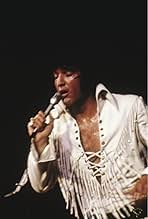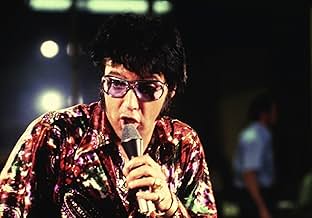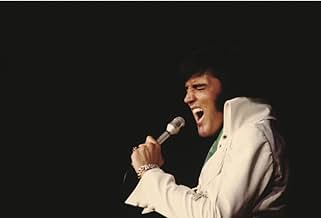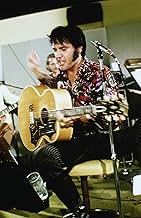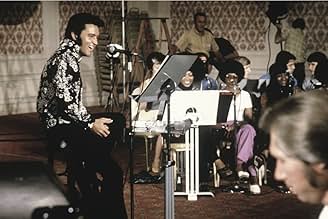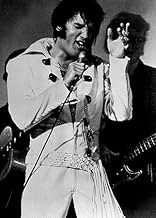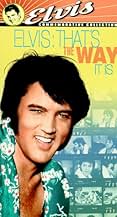NOTE IMDb
7,9/10
3,4 k
MA NOTE
Après des années à faire des films, Elvis fait un retour triomphal sur scène en 1970. Maintenant, regardez les images des coulisses des répétitions et les performances dans l'un des regards ... Tout lireAprès des années à faire des films, Elvis fait un retour triomphal sur scène en 1970. Maintenant, regardez les images des coulisses des répétitions et les performances dans l'un des regards les plus intimes d'Elvis capturés sur film.Après des années à faire des films, Elvis fait un retour triomphal sur scène en 1970. Maintenant, regardez les images des coulisses des répétitions et les performances dans l'un des regards les plus intimes d'Elvis capturés sur film.
Glen D. Hardin
- Self - Musician
- (as Glen Hardin)
Charlie Hodge
- Self - Musician
- (as Charley Hodge)
Estell Brown
- Self - Background Vocalist
- (as The Sweet Inspirations)
Sylvia Shemmell
- Self - Background Vocalist
- (as The Sweet Inspirations)
Ann Williams
- Self - Background Vocalist
- (as The Sweet Inspirations)
Roger Wiles
- Self - Background Vocalist
- (as The Imperials)
Jim Murray
- Self - Background Vocalist
- (as The Imperials)
Joe Moscheo
- Self - Background Vocalist
- (as The Imperials)
Armando Morales
- Self - Background Vocalist
- (as The Imperials)
Terry Blackwood
- Self - Background Vocalist
- (as The Imperials)
Avis à la une
I thoroughly enjoy and appreciate this film because of the way it showcases the King of Rock and Roll on stage in Vegas during what was very easily one of the best years of his career. It's in this film that we get to see him at his raw and energetic best. The footage from the backstage rehearsals only add to its tremendous entertainment value. If you're a fan of Elvis Presley and haven't seen this movie yet, do yourself a favor and check it out. You won't be disappointed in the very least.
Sorry, but I'm not made of wood, people. I should probably mention right now as some sort of disclaimer that I'm going to do my best to focus on the details of the new Special Edition DVD here, but I was seriously distracted from technical details because Elvis looks so damn gorgeous and sexy in this footage. I'm not exaggerating, nor am I alone here. I've read at least 20 books about Elvis by those who were closest to him, and they all agree that he hit his peak around 69-70. By 68 he lost all the baby fat he had before and then some, was in the best shape of his life, tan, healthy, and confident. "Thin as a rake and more handsome than 10 movie stars" is the quote from a reporter that kept coming to my mind. Members of the Memphis Mafia said that around this time, they would frequently be looking for Elvis and find him admiring himself in the mirror and saying things like, "Damn, I'm one good-lookin' sonofagun!". Watching this movie, you definitely don't blame him one bit. I better just move on to the actual movie here before I start really embarrassing myself, but I think most people would agree that it's probably impossible for anyone to watch this and not see why Elvis caused women to completely lose control around him.
OK, anyway, where was I? Since this hasn't gone into wide release as of this writing, we were lucky to find a rental DVD copy a few days ago. I'd heard it was great, but expected maybe 1 or 2 new songs or alternate takes and 5 minutes more of rehearsal footage, plus a better picture/ sound quality. This is just like a second (better, I thought) version of the movie. Most of the footage of the fans that went on too long in the first version is gone. I have to admit that some of the original interviews with babbling fans loaded down with every type of Elvis souvenir (and it if it was wearable, wearing it all at once) probably helped cause the stereotype most people have of Elvis fans as lunatics. I've had people (usually, they were born after Elvis passed away) look at me like they way they would at a member of a cult dancing around in an airport when I mention that I'm a big Elvis fan. This version might make those people change their mind, or at the very least, see why Elvis has so many fans in the first place.
Instead of the insane fan interviews, there's plenty of rehearsal footage. Most of it is new, and amazing. It also reminded me strongly of the section of the 68 comeback special (and also "One Night With You") where Elvis jammed with his old band, just having fun. Again, I'm kind of fuzzy on the exact songs and the order they're in, ("Little Sister" was probably the best) but most of it is not in the 1970 version, including him talking to the Sweet Inspirations and joking with the band. The concert footage is amazing. Even though it's spliced together using the best of 6 different shows (not that I would have minded sitting through all of them) the performance is so energetic and intense that I can't believe that Elvis did his act twice a night, 7 days a week. Biographers say that Elvis actually requested not to have a day off because he was having so much fun when he first started playing Vegas, and it's obvious from watching this footage that he was having the time of his life. Most of the patter between songs is different, and so are some of his interactions with the audience. There's an extended version of "Suspicious Minds" that's even more impressive than the other one, using alternate takes (they leave out "I hope this suit don't tear up baby", and put in more of the type of dancing that, how do I put this politely, got him banned from the waist down in the 50's ). Just a complete show-stopper. You have to see it to believe it. And if you already thought Elvis was hot, you might want to have that bucket of cold water handy to pour over your head before you sit down to watch this.
Some of the extras include an extremely entertaining trailer that makes you want to watch the movie again immediately, and a pretty interesting "making of" documentary. Obviously, a lot of care and time was taken to produce this new version; this is not something they just slapped together at the last minute just to cash in on the popularity of special edition DVDs. Elvis fans, you have got to own this-or at least see it ASAP, at which point you'll want to buy a copy. I still haven't picked my jaw up off the floor. At some points when you're watching the movie, it's hard to believe he's gone. But it's not hard to believe he would have been very proud of this edition.
OK, anyway, where was I? Since this hasn't gone into wide release as of this writing, we were lucky to find a rental DVD copy a few days ago. I'd heard it was great, but expected maybe 1 or 2 new songs or alternate takes and 5 minutes more of rehearsal footage, plus a better picture/ sound quality. This is just like a second (better, I thought) version of the movie. Most of the footage of the fans that went on too long in the first version is gone. I have to admit that some of the original interviews with babbling fans loaded down with every type of Elvis souvenir (and it if it was wearable, wearing it all at once) probably helped cause the stereotype most people have of Elvis fans as lunatics. I've had people (usually, they were born after Elvis passed away) look at me like they way they would at a member of a cult dancing around in an airport when I mention that I'm a big Elvis fan. This version might make those people change their mind, or at the very least, see why Elvis has so many fans in the first place.
Instead of the insane fan interviews, there's plenty of rehearsal footage. Most of it is new, and amazing. It also reminded me strongly of the section of the 68 comeback special (and also "One Night With You") where Elvis jammed with his old band, just having fun. Again, I'm kind of fuzzy on the exact songs and the order they're in, ("Little Sister" was probably the best) but most of it is not in the 1970 version, including him talking to the Sweet Inspirations and joking with the band. The concert footage is amazing. Even though it's spliced together using the best of 6 different shows (not that I would have minded sitting through all of them) the performance is so energetic and intense that I can't believe that Elvis did his act twice a night, 7 days a week. Biographers say that Elvis actually requested not to have a day off because he was having so much fun when he first started playing Vegas, and it's obvious from watching this footage that he was having the time of his life. Most of the patter between songs is different, and so are some of his interactions with the audience. There's an extended version of "Suspicious Minds" that's even more impressive than the other one, using alternate takes (they leave out "I hope this suit don't tear up baby", and put in more of the type of dancing that, how do I put this politely, got him banned from the waist down in the 50's ). Just a complete show-stopper. You have to see it to believe it. And if you already thought Elvis was hot, you might want to have that bucket of cold water handy to pour over your head before you sit down to watch this.
Some of the extras include an extremely entertaining trailer that makes you want to watch the movie again immediately, and a pretty interesting "making of" documentary. Obviously, a lot of care and time was taken to produce this new version; this is not something they just slapped together at the last minute just to cash in on the popularity of special edition DVDs. Elvis fans, you have got to own this-or at least see it ASAP, at which point you'll want to buy a copy. I still haven't picked my jaw up off the floor. At some points when you're watching the movie, it's hard to believe he's gone. But it's not hard to believe he would have been very proud of this edition.
Denis Sanders garnered high honors for directing this somewhat candid view of Elvis Presley at work and play, preparing for his summer 1970 stint in Las Vegas. Elvis at this time was still in his return to splendor. Looking fit and a fine specimen of singing, sex machine. Not yet feeling the passion for the real gaudy, sparkling costumes. Relaxed, but nervous; Presley plays and clowns for the camera. A lot of hard work and rehearsing culminates into a high energy performance on stage. Captured on film is just a portion of what made Elvis one of the world's most admired and beloved entertainers.
They cleaned up the print and soundtrack, got ridda interviews with the Velvet Elvis fan-clubs(the types who claim their Cats listen to the King), the array of Sammy Davis Jr. types in attendence, and put in more lost footage of Elvis jamming/rehearsing in LA with the band. There is a version of 'Get Back' that has to be heard-it medleys into 'Little Sister' and works great.
As for the Hotel Casino concert that follows-it's great, of course. He trots out the expected hits-'Heartbreak Hotel', 'Can't Help Falling in Love', 'Suspicious Minds', etc. the last a highlight along with 'In the Ghetto' and 'Polk Salad Annie'.
He is great form, both vocally, in front of the audience and with the band. Enjoyable also is the interplay between Elvis and Hardin, Scheff and Burton, a primo guitarist if there ever was one. You can also see Cissy Houston(Whitney's mom) as one of the Sweet Inspirations backing him up.
Too often Elvis the musician, singer and regular guy-as reg as he could ever be-gets shoved aside by the nightmarish late period stereotype we all know and dread. This goes a good deal towards correcting that.
*** outta ****-good show.
As for the Hotel Casino concert that follows-it's great, of course. He trots out the expected hits-'Heartbreak Hotel', 'Can't Help Falling in Love', 'Suspicious Minds', etc. the last a highlight along with 'In the Ghetto' and 'Polk Salad Annie'.
He is great form, both vocally, in front of the audience and with the band. Enjoyable also is the interplay between Elvis and Hardin, Scheff and Burton, a primo guitarist if there ever was one. You can also see Cissy Houston(Whitney's mom) as one of the Sweet Inspirations backing him up.
Too often Elvis the musician, singer and regular guy-as reg as he could ever be-gets shoved aside by the nightmarish late period stereotype we all know and dread. This goes a good deal towards correcting that.
*** outta ****-good show.
Filmgoers were treated to two rockumentaries in 1970. The first, "Let It Be," shows the greatest rock n' roll band ever, The Beatles, struggling unsuccessfully to get out of its first and only decade of existence. The second, "That's The Way It Is," shows the greatest rock n' roll singer ever, Elvis Presley, entering his third decade of stardom lean, mean, and taking no prisoners.
The form of both is almost identical. You see rehearsal footage in a studio, some backstage chatter, and then a live performance before an enthused crowd. But while "Let It Be" is more interesting as a historical document than entertainment, "That's The Way It Is" is a powerful, galvanizing performance piece that stands up as well now as it did in 1970.
Even better than in 1970, many would say, because the version we have now is heavily re-edited, using unused footage from the original filming, mostly focused on Elvis, and discarding other bits showing interviews with fans. (You can see the seams, though, as many of the patched-in bits have a washed-out color scheme immediately apparent when contrasted with the vibrant Lucien Ballard photography of the original film.)
I'm not sure I like the idea of tampering with the record, but it's hard to bicker with results. The new "Way It Is" has a power and freshness that makes you feel the vitality of Elvis, who by 1970 was at least a half-step behind the fashion of the times but a better performer than ever. Since the film features Elvis in a series of Vegas shows (six filmed over three days in August, 1970, just seven years before his death) it's not unnatural to expect a bloated rhinestone-encrusted drug addict with velcro sideburns performing hokey schmaltz, as the myth perpetuated by his detractors would have it. But 1970 was a very good year for the King. He was not only in fine physical shape, he had matured into a vocalist who had married his awesome power with subtlety and finesse, and found his voice in a series of country-tinged rock songs that complemented him nicely even if they never achieved the pop status of his earlier hits. Songs like "Patch It Up," "Just Pretend," "Twenty Days And Twenty Nights" and "Tiger Man" (seen in a killer title sequence juxtaposed with Elvis's standard show-opener "Mystery Train") are thrilling, classic-sounding numbers not burdened today by overplay on oldies radio stations. Even his outfits were in surprisingly good taste for the period, at times even casual and comfortable-looking.
In rehearsal and on stage, Elvis works in his biggest hits of yore, which he seems almost embarrassed by and trots out almost perfunctorily, then throws in newer songs recorded by other artists, like the Bee Gees' "Words" and The Righteous Brothers "You've Lost That Loving Feeling," that he invests with real conviction and passion. He was a real artist, always moving forward, finding brilliance in the work of others, and believing in the power of song.
There are many highlights in this film. Elvis throws himself into each number he performs on stage like its his last moment on earth, even his older hits once he warms up to them. His "Love Me Tender" sends him into the audience for a lengthy series of kisses with delighted female audience members, and what blows you away is not so much the serial smooching but the way Elvis makes an effort to offer serious eye contact to everyone who approaches him, and thanks them sincerely when he returns to the safety of the stage. "Sorry I couldn't make it up there," he yells to the people in the balcony, and I think he meant it.
I especially appreciated the chance to see Elvis's interaction with his bandmates, a killer ensemble led by guitarist extraordinaire James Burton and drummer Ronnie Tutt, who was probably the only guy in 1970 who could have given Keith Moon a run for his money in a "Wipeout" faceoff. "The backbone of my whole show," he calls his musicians in a typical moment of humility. Elvis is also accompanied by the playful and vibrant Sweet Inspirations and the Imperials, male back-up singers who resemble Elvis impersonators before their time.
Elvis comes across as genuinely decent and sweet, but doesn't let you into his world too much. That's just as well when you get a load of his unctuous retinue, the Memphis Mafia, a squalid band of freeloaders and enablers who sped the King to his sordid doom. They giggle and interfere a bit, enough to remind you of the dark side of Elvis's celebrity, but in the end what you have is a prime slice of music greatness, the greatest vocalist of his day finding new power in his reinvention as rock's elder statesman and most accomplished showman, plowing through songs like "Polk Salad Annie" and "I Can't Stop Loving You" like he was plugged into God's private frequency.
I'd never say the Beatles were a shabby second to Elvis, but it's hard not to see them falling short in the rockumentary department. Elvis even delivers a better version of "Get Back" (though he seems to think the title is "Take It Back.") This is a film you will want to see at least once, just to get a sense of who Elvis was just before the money-changers moved into the temple and the man was hijacked by the legend.
The form of both is almost identical. You see rehearsal footage in a studio, some backstage chatter, and then a live performance before an enthused crowd. But while "Let It Be" is more interesting as a historical document than entertainment, "That's The Way It Is" is a powerful, galvanizing performance piece that stands up as well now as it did in 1970.
Even better than in 1970, many would say, because the version we have now is heavily re-edited, using unused footage from the original filming, mostly focused on Elvis, and discarding other bits showing interviews with fans. (You can see the seams, though, as many of the patched-in bits have a washed-out color scheme immediately apparent when contrasted with the vibrant Lucien Ballard photography of the original film.)
I'm not sure I like the idea of tampering with the record, but it's hard to bicker with results. The new "Way It Is" has a power and freshness that makes you feel the vitality of Elvis, who by 1970 was at least a half-step behind the fashion of the times but a better performer than ever. Since the film features Elvis in a series of Vegas shows (six filmed over three days in August, 1970, just seven years before his death) it's not unnatural to expect a bloated rhinestone-encrusted drug addict with velcro sideburns performing hokey schmaltz, as the myth perpetuated by his detractors would have it. But 1970 was a very good year for the King. He was not only in fine physical shape, he had matured into a vocalist who had married his awesome power with subtlety and finesse, and found his voice in a series of country-tinged rock songs that complemented him nicely even if they never achieved the pop status of his earlier hits. Songs like "Patch It Up," "Just Pretend," "Twenty Days And Twenty Nights" and "Tiger Man" (seen in a killer title sequence juxtaposed with Elvis's standard show-opener "Mystery Train") are thrilling, classic-sounding numbers not burdened today by overplay on oldies radio stations. Even his outfits were in surprisingly good taste for the period, at times even casual and comfortable-looking.
In rehearsal and on stage, Elvis works in his biggest hits of yore, which he seems almost embarrassed by and trots out almost perfunctorily, then throws in newer songs recorded by other artists, like the Bee Gees' "Words" and The Righteous Brothers "You've Lost That Loving Feeling," that he invests with real conviction and passion. He was a real artist, always moving forward, finding brilliance in the work of others, and believing in the power of song.
There are many highlights in this film. Elvis throws himself into each number he performs on stage like its his last moment on earth, even his older hits once he warms up to them. His "Love Me Tender" sends him into the audience for a lengthy series of kisses with delighted female audience members, and what blows you away is not so much the serial smooching but the way Elvis makes an effort to offer serious eye contact to everyone who approaches him, and thanks them sincerely when he returns to the safety of the stage. "Sorry I couldn't make it up there," he yells to the people in the balcony, and I think he meant it.
I especially appreciated the chance to see Elvis's interaction with his bandmates, a killer ensemble led by guitarist extraordinaire James Burton and drummer Ronnie Tutt, who was probably the only guy in 1970 who could have given Keith Moon a run for his money in a "Wipeout" faceoff. "The backbone of my whole show," he calls his musicians in a typical moment of humility. Elvis is also accompanied by the playful and vibrant Sweet Inspirations and the Imperials, male back-up singers who resemble Elvis impersonators before their time.
Elvis comes across as genuinely decent and sweet, but doesn't let you into his world too much. That's just as well when you get a load of his unctuous retinue, the Memphis Mafia, a squalid band of freeloaders and enablers who sped the King to his sordid doom. They giggle and interfere a bit, enough to remind you of the dark side of Elvis's celebrity, but in the end what you have is a prime slice of music greatness, the greatest vocalist of his day finding new power in his reinvention as rock's elder statesman and most accomplished showman, plowing through songs like "Polk Salad Annie" and "I Can't Stop Loving You" like he was plugged into God's private frequency.
I'd never say the Beatles were a shabby second to Elvis, but it's hard not to see them falling short in the rockumentary department. Elvis even delivers a better version of "Get Back" (though he seems to think the title is "Take It Back.") This is a film you will want to see at least once, just to get a sense of who Elvis was just before the money-changers moved into the temple and the man was hijacked by the legend.
Le saviez-vous
- AnecdotesFootage of the party held in Elvis Presley's suite after his August 10th, 1970 opening show finds him in the company of Sammy Davis Jr., Cary Grant, Kenny Rogers, and Roman Polanski.
- Citations
Elvis Presley: If the songs don't go over, we can do a medley of costumes.
- Crédits fousThe end credits showed Elvis greeting people backstage following the show.
- Versions alternativesIn 2001, a new version of That's the Way it Is was compiled. The new version eliminated much of the documentary and non-Elvis content of the original in favor of adding additional performances of Elvis rehearsing and in concert. The final film runs 12 minutes shorter than the original, but contains more music, although several performances included in the original film are omitted (most notably the concert performance of "I Just Can't Help Believin'", even though the new version of the film features footage of Presley rehearsing the song and being concerned about remembering its lyrics on stage). The special edition was released on January 19, 2001, when this new version made its worldwide debut on the cable network Turner Classic Movies, and was produced by award-winning producer Rick Schmidlin. In August 2007 a two-disc DVD "special edition" was released by Warner/Turner that has both the reworked version plus the original cut. The original, however, has only a mono soundtrack (it was made with four-track stereo). The DVD also includes approximately 35 minutes of additional performances and other footage that was not included in either edition.
- ConnexionsEdited into Elvis: The Lost Performances (1992)
Meilleurs choix
Connectez-vous pour évaluer et suivre la liste de favoris afin de recevoir des recommandations personnalisées
- How long is Elvis: That's the Way It Is?Alimenté par Alexa
Détails
- Date de sortie
- Pays d’origine
- Site officiel
- Langue
- Aussi connu sous le nom de
- Elvis: That's the Way It Is
- Lieux de tournage
- Société de production
- Voir plus de crédits d'entreprise sur IMDbPro
Box-office
- Montant brut mondial
- 34 301 $US
- Durée
- 1h 37min(97 min)
- Couleur
- Mixage
- 4-Track Stereo(original version)
- Rapport de forme
- 2.35 : 1
Contribuer à cette page
Suggérer une modification ou ajouter du contenu manquant


